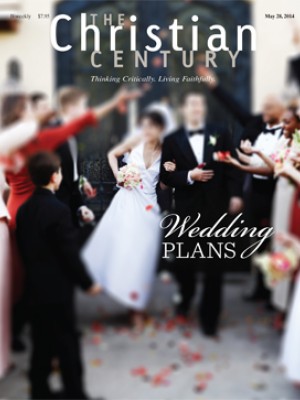Sunday, June 8, 2014
Last spring, as the church moved from Easter to Pentecost, the governor of Minnesota signed a bill legalizing gay marriage. Some anticipated another Pentecost when the weather report predicted high winds at the hour of the signing. Some dreamed new dreams; others saw the fire of judgment. Interestingly, all seemed to believe that the events at the statehouse mattered to God.
Earlier that spring, I went to the capitol to hear the debates. I hadn’t expected so much religious fervor. People on both sides were prophesying, singing the songs of their traditions, meeting in corners to call down the Holy Spirit. I suspect there hadn’t been that many Bibles in the building since the day new legislators dusted off their old family Bibles for the inauguration. One of my friends said, “Church broke out at the capitol today.”
Read our latest issue or browse back issues.
At one point, I went up to the third-floor balcony and looked down. Half the capitol was filled with fuchsia “Vote No” signs; the other half was orange “Vote Yes” signs. Upstairs, the sound of their chants merged as it bounced off the marble walls and headed into the dome. All our prayers, the ones we shared and the ones that sounded like point and counterpoint, were mixed together in their ascent into the dome of heaven.
Is this what God hears, one great cry offered up from our hope and our fear? We may experience division on the ground, hearing only what’s so loud right next to us. But God hears us as one human family, crying out for blessing, redeemed by the work of Christ—Jews and proselytes, Cretans and Arabs.
Maybe the Pentecost story isn’t so much about us and our hopes to unite or divide as it is about a God who can make a diverse creation into a place of blessing and new life. Pentecost is something we’re simply called to trust. It’s not about the mysterious wind or miraculous fire, or even the speaking in different tongues. It’s about God healing the divisions set into motion at the tower of Babel, when different languages, cultures, and viewpoints were experienced as a punishment. When we hear about the crowd’s ability to understand the disciples’ preaching in their own language, we experience the way that God has always heard us.
It’s hard to read Acts without thinking of Genesis. At the beginning of time, human beings are charged to go forth and multiply blessing for the whole creation. But before long they grow afraid of the wideness of God’s creation. So they make it smaller, circling their communities with walls and towers, making stone and certainty their promise for the future. Walter Brueggemann suggests that their scattering, the confusion of their languages, has the effect of sending them forth yet again into the wideness of creation’s promise. For centuries, they would tell the story as if it were judgment, yet all along God meant it for blessing.
When the disciples gather in the safety of the upper room—50 long days since the confusion of Easter—God simply sends the Spirit so that the story will, yet again, move forward. Certainly, the experience is new for them, blown into the power of love as if they can hear it for the first time. Yet it is once again God’s reigniting work to fill every single corner of the earth with love and blessing. In the mystery of fire and wind, language and understanding, the fearful disciples are converted to the work that God has always been doing.
This is, of course, Jesus’ work: to love as God loves, to gather and unite, to forgive and raise up. The community gathered in that room could articulate every kind of reason not to go—lacking the right words or training or free time or money. Yet they are suddenly and miraculously inspired, despite themselves, to act just like Jesus. The Spirit embodied in Jesus now fills their bodies—the body of Christ.
Today, our shifting cultural landscape creates fear about our future. We might not be gathered in an upper room, but there is a lot of fear in church basements. We wonder if our towers and our treasured belief will survive the winds of this century.
We tell our children that Pentecost is the church’s birthday, but it’s not the founding of an institution. It’s the inauguration of a movement of people, marked with the cross of Christ, who speak blessing and take back curses. Years ago I heard a Pentecost children’s sermon in which the pastor asked the children how many candles should be on the church’s birthday cake. Eventually, one kid guessed the year—but she added that “you can’t blow out that many candles.”
Again and again, God promises to set us on fire with a promise that cannot be extinguished. From the pinnacle of Pentecost, we hear that God is already at work filling the whole creation with blessing. There’s a wind of grace that’s blowing through capitols and churches, neighborhoods and hearts. If we’re not careful, it’s going to carry us away, too—to the ends of the earth, or at least out the door and into the wideness of creation. That will be the blessing we’ve dreamed about.





